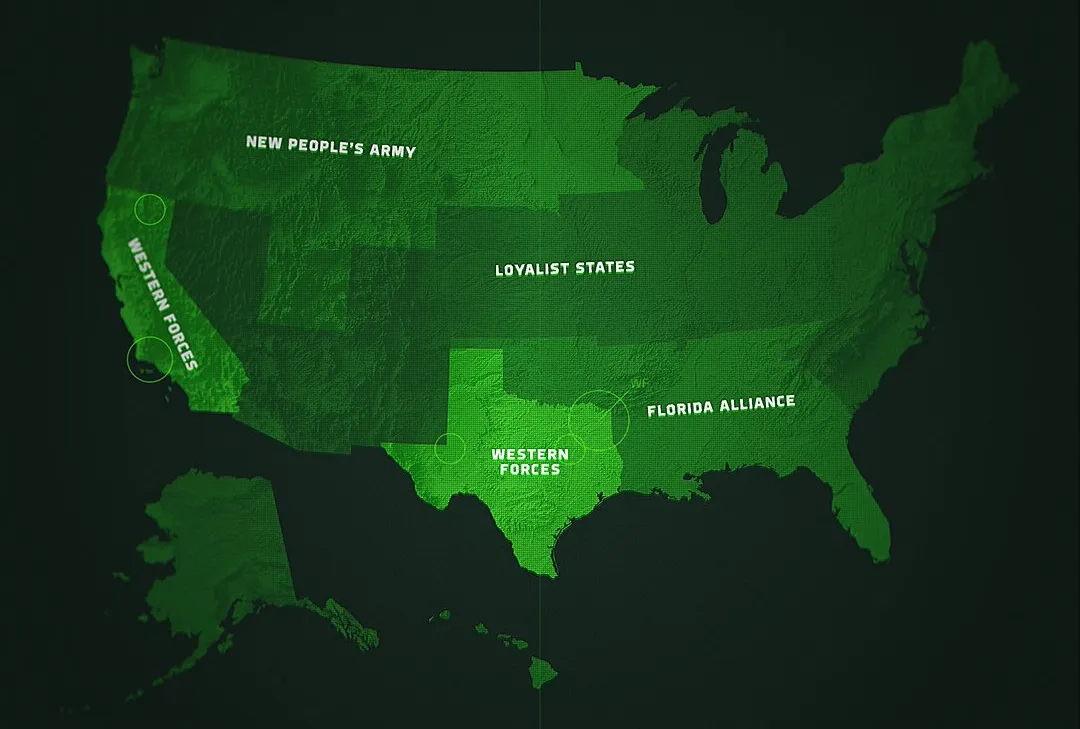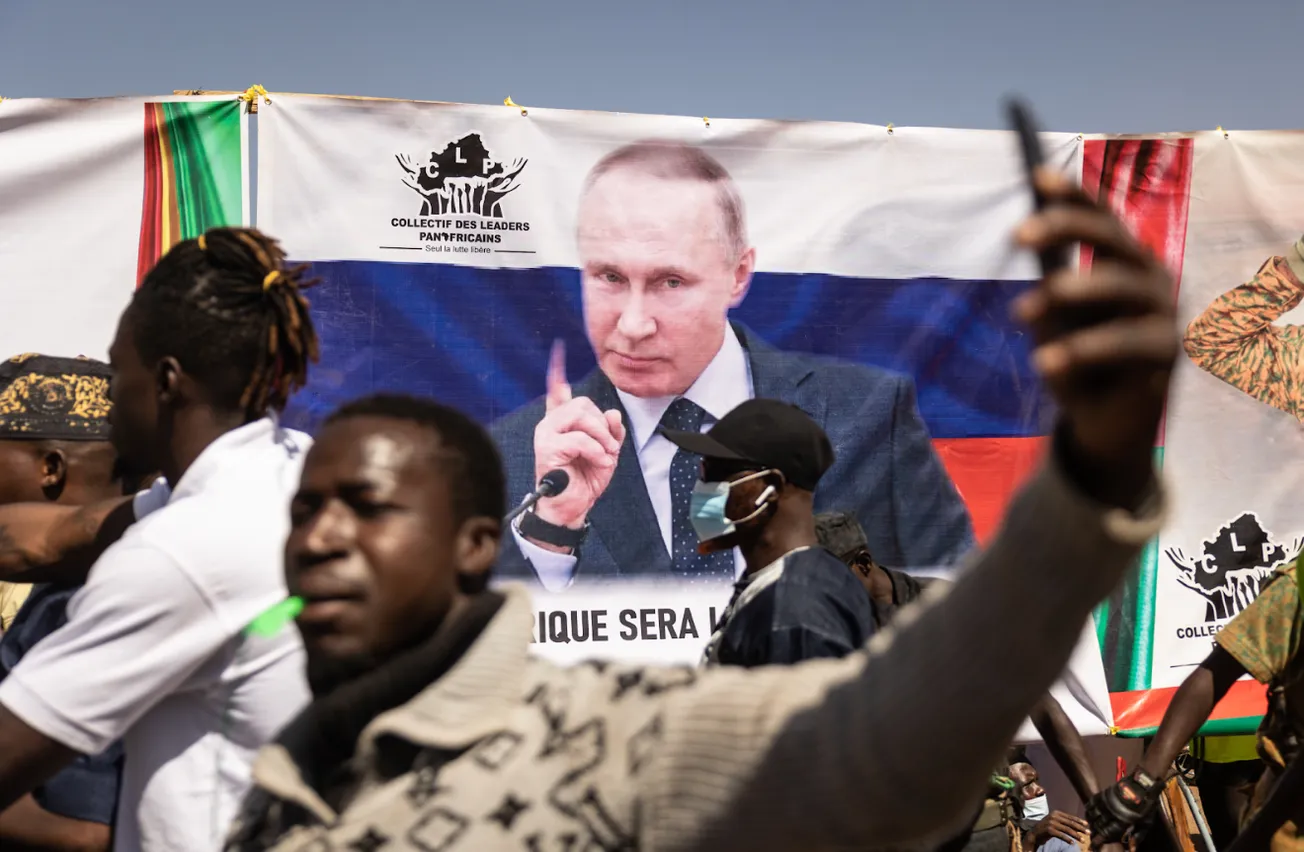Table of Contents
America is on fire. Or, at least it is in A24’s latest feature film, Civil War (2024). In the Alex Garland war flick, set in the near-present, we see a vision of the nation where a violent civil war has broken out between the Loyalist States, the Western Forces (an unlikely pairing of Texas and California), and the Florida Alliance.
The film does not give the viewer much information about the catalyst for this catastrophic war, only hinting that the film’s fictitious President (Nick Offerman) broke with precedent by taking a third term. Instead, it drops us directly into the middle of a country that bears only a passing resemblance to the USA that we currently call home. In Garland’s world, paramilitary units enforce their own laws, journalists are shot on sight in the capitol, and cellular service is suppressed. To quote Charles Dickens, “it [i]s the worst of times.”
Led by intrepid photographer Lee, portrayed by Kirsten Dunst in a career-best role, the film follows a group of photojournalists who attempt to reach Washington D.C. and interview the sitting President before he is inevitably assassinated by the soon-to-be-victorious Western Forces, a secessionist government. In their journey to the capitol, we bear witness to the brutal mental and physical violence caused by the war, heightened by Garland and Co’s aggressive editing and forceful sound design that demands to be experienced in an IMAX theater; I routinely found myself shaken in my seat when the film abruptly cuts from a quiet parking lot to an active shootout.
Aside from the powerful visuals and grounded battle scenes, the film’s most impactful element is its social and political commentary, which manages to feel timely despite a lack of partisan bias. Granted, there are allusions to some of our modern political trends that eagle-eyed viewers and political junkies alike will surely take note of: In the film’s opening scene, the President gives an address to the nation following a battle between Loyalist states and the Western Forces in which he describes the victory in distinctly Trumpian verbiage: “Some are calling it the greatest military victory of all time.” Such dialogue harkens back to Mr. Trump’s tendency to qualify his statements with phrases such as “a lot of people are saying.”
Another Trump reference can be found in one of the film’s most memorable scenes, where an unnamed militia soldier (Jesse Plemons) sports a unique pair of bright red sunglasses and asks our ensemble cast, “What kind of American are you?” and proceeds to kill two Hong Kong citizens. This color choice, combined with the overtly racist line, seems to be the filmmakers’ attempt to connect this character with the now-iconic red, MAGA hat often worn by Mr. Trump and his supporters, as well as to the larger MAGA movement.
Aside from these deep cuts, the film is largely neutral in its political commentary. The party of the sitting president is unknown. The Western Forces are composed of both liberal California and conservative Texas. It is also notable that, even in a post-January 6th world, the “good” side (Western Forces) are the ones who raid the White House and violently depose the duly-elected president. Much to the disappointment of Hollywood liberals who wanted the film to be left-wing propaganda, Garland, with laudable initiative, stays above party politics and crafts a film that is neither anti-Trump nor anti-woke, but simply anti-civil-war.
When it comes to lessons we can impart on our democratic system, one of the film’s most important insights is one that leftists seem to be ignoring at every turn: when people stop talking, violence becomes orders of magnitude more likely. This is harrowingly exemplified in the scene where two soldiers camp outside of a barn and shoot the marksman inside, despite not knowing who he is or what he wants from them. No words are exchanged between the combatants––conflict seems to be a forgone conclusion.
When Americans refuse to have honest and open debate despite their ideological differences, (i.e. secede from the nation or walk away from discussions that make them uncomfortable), it becomes that much easier to see the “other side” as an enemy. Civil War shows us the horror that unfolds when we lose sight of this humanity and vilify those with alternative viewpoints.
Given that we are currently in the midst of what will be one of the most tense elections in modern American history, I had a premonition that Civil War could be what happens in November if certain segments of the electorate are sufficiently outraged about the results. While unlikely, there is, unfortunately, a non-zero chance of this happening, and this is why Civil War is such an important film for this moment in history.
Civil War is a cautionary tale, one that propels us forward in our mission of independent journalism and thoughtful dialogue. We can only hope the nation gleans the same lesson.









